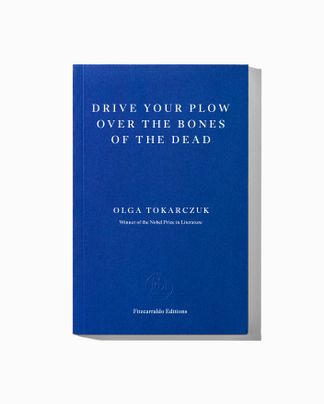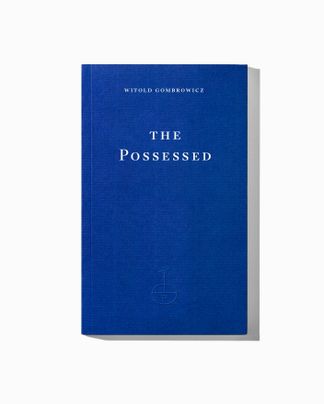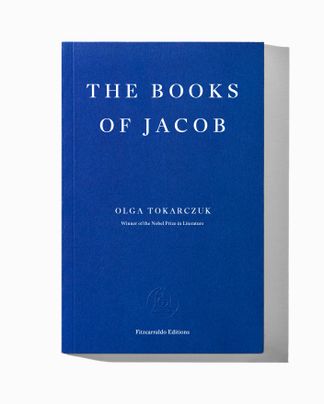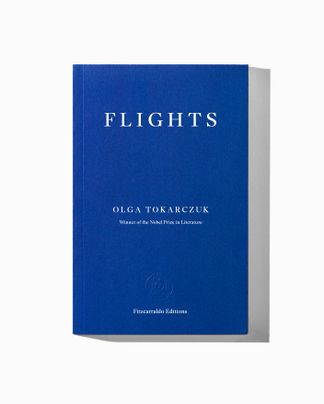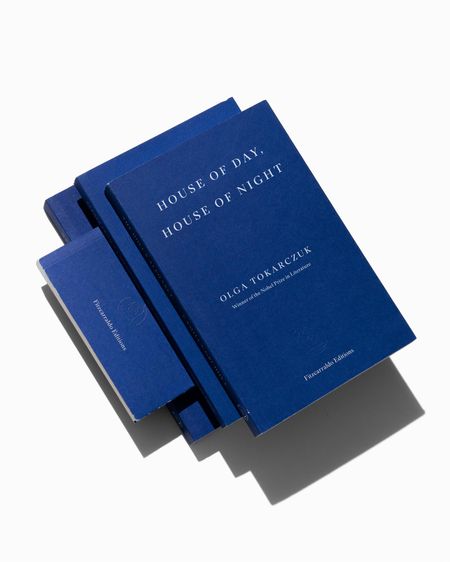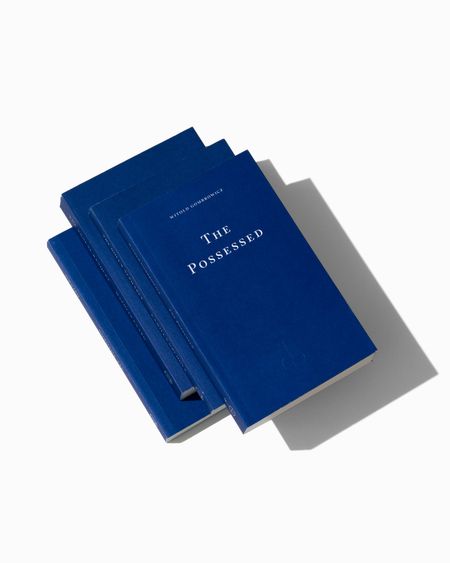In September 1913, a young Pole suffering from tuberculosis arrives at Wilhelm Opitz’s Guesthouse for Gentlemen, a health resort in the Silesian mountains. Every evening the residents gather to imbibe the hallucinogenic local liqueur and debate the great issues of the day: monarchy or democracy? Do devils exist? Are women born inferior? War or peace? Meanwhile, disturbing things are happening in the guesthouse and the surrounding hills. Someone – or something – seems to be watching, attempting to infiltrate this cloistered world. Little does the newcomer realize, as he tries to unravel both the truths within himself and the mystery of the sinister forces beyond, that they have already chosen their next target. A century after the publication of The Magic Mountain, Olga Tokarczuk revisits Thomas Mann territory and lays claim to it, blending horror story, comedy, folklore and feminist parable with brilliant storytelling.
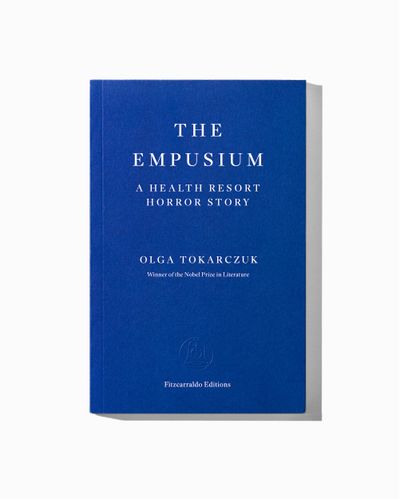
The Empusium: A Health Resort Horror Story
Translated by Antonia Lloyd-Jones
French paperback with flaps, 336 pages | Audiobook read by Natasha Soudek
Published 26 September 2024
The Empusium: A Health Resort Horror Story
Translated by Antonia Lloyd-Jones
I .
THE GUESTHOUSE FOR GENTLEMEN
The view is obscured by clouds of steam from the locomotive that trail along the platform. To see everything we must look beneath them, let ourselves be momentarily blinded by the grey haze, until the vision that emerges after this trial run is sharp, incisive and all-seeing.
Then we shall catch sight of the platform flagstones, squares overgrown with the stalks of feeble little plants – a space trying at any cost to keep order and symmetry.
Soon after, a left shoe appears on them, brown, leather, not brand new, and is immediately joined by a second, right shoe; this one looks even shabbier – its toe is rather scuffed, and there are some lighter patches on the upper. For a moment the shoes stand still, indecisively, but then the left one advances. This movement briefly exposes a black cotton sock beneath a trouser leg. Black recurs in the tails of an unbuttoned wool coat; the day is warm. A small hand, pale and bloodless, holds a brown leather suitcase; the weight has caused the veins to tense, and now they indicate their source, somewhere deep inside the bowels of the sleeve. Under the coat we glimpse a flannel jacket of rather poor quality, slightly crumpled by the long journey and marked by tiny bright dots of some non-specific impurity – the world’s chaff. The white collar of a shirt is visible too, the button-on kind, evidently changed quite recently, because its whiteness is fresher than the white of the actual shirt and contrasts with the sallow tone of the traveller’s face. Pale eyes, eyebrows and eyelashes make this face look unhealthy. Against the deep red of the western sky the whole figure gives the unsettling impression of having arrived here, in these melancholy mountains, from the world beyond.
The new arrival walks towards the main hall of the station, surprisingly large for this highland region, along with the other passengers, but unlike them walks unhurriedly, perhaps reluctantly, and is not greeted or met by anyone. Putting the suitcase down on the worn tiled floor, the traveller pulls on a pair of quilted gloves. One of them, on the right hand, is soon curled and put to the mouth to receive a volley of short, dry coughs.
The young person stoops and searches for a pocket handkerchief. The fingers alight on the spot where a passport is hidden beneath the fabric of the coat. If we focus our attention on it, we shall see the fanciful handwriting of a Galician official, who has carefully filled in the fields on the document as follows: Mieczysław Wojnicz, Catholic, student at Lwów Polytechnic, born 1889, eyes blue, height average, face round, hair fair.
The said Wojnicz is now heading for the main station hall in Dittersbach, a small town near Waldenburg. As he walks hesitantly across this tall, gloomy space, where an echo is sure to inhabit the top cornices, he can sense someone’s eyes scrutinizing him from behind the ticket windows in the waiting room. Wojnicz checks the time on a large clock – it is late, his was the last train from Breslau – then, after a moment’s dithering, goes out in front of the station building, where at once he is enfolded in the broad embrace of the ragged mountain horizon.
It is mid-September, but here, as the newcomer notices to his amazement, the summer is already long over and the first fallen leaves are lying on the ground. The past few days must have been rainy, because a light mist still fills most of the landscape, making an exception only for the dark lines of streams. Wojnicz’s lungs feel the high altitude, which is good for his enfeebled body. He stands on the station steps, suspiciously eyeing the thin leather soles of his shoes; he will have to think about winter boots. In Lwów the asters and zinnias are still flowering, and no one has thought about the autumn yet. But here the tall horizon makes it darker, and the colours seem more garish, almost vulgar. Just then he is overcome by a familiar sense of sadness, typical of those convinced of their own impending death. The world around him feels like stage scenery painted on a paper screen, as if he could stick a finger into this monumental landscape and drill a hole in it leading straight to nothingness. And as if nothingness will start pouring out of there in a flood, and will catch him up too, grab him by the throat. He has to shake his head to be rid of this image. It shatters into droplets and falls onto the leaves. Luckily an ungainly vehicle resembling a britzka comes rolling along the road towards him. In it sits a slim, freckled boy wearing a strange outfit, reminiscent of a military jacket of obscure provenance – not like a Prussian uniform, which would be understandable in this place – and a military forage cap, fancifully tilted on his head. Without a word he stops in front of Wojnicz and, muttering something, takes his luggage.
‘How are you, my good fellow?’ asks Wojnicz politely in schoolboy German, but he waits in vain for an answer; the boy pulls his cap low and impatiently points to a seat for him in the britzka.
And at once they move off. First through the town over cobblestones, then along a road that in the falling darkness takes them through forest, along a winding track between steep mountain slopes. They are accompanied by the constant murmur of a nearby stream and its smell, which unsettles Wojnicz badly: the odour of damp brush, rotting leaves, eternally wet stones and water. In an attempt to establish contact he asks the driver questions, how long will their journey be, for example, how did he recognize him at the station, what is his name, but the boy remains silent and does not even glance at him. A gas lantern placed on the boy’s right side partly illuminates his face, which in profile resembles the snout of a highland rodent, a marmot, and Wojnicz guesses he must be either deaf or insolent.
After about three quarters of an hour, they emerge from the shadow of the forest onto an unexpected plateau between the wooded mountains. The sky is fading, but that tall, imposing horizon, still visible, brings a lump to the throat of any new arrival from the lowlands. ‘Görbersdorf,’ says the driver suddenly, in an unexpectedly shrill, boyish tone.
(…)
‘Tokarczuk’s fiction is built on filtering fragments of the past – people, stories, myths, orthodoxies – through a contemporary lens…. The Empusium is much less a debate of ideas than a study of our perception and the limits of sensory experience. Reality, or rather its elusiveness, preoccupies much of Tokarczuk’s work, which frequently blends genres as a way to get closer to, if not at, what’s true…. Grotesque sexism aside, there is spectacular humour to these scenes as the grandeur of their self-image is so elegantly undermined by the narrator’s description of them…. This too is a novel that in Tokarczuk’s dexterous hands transcends its own limits, further cementing the Nobel laureate as one of the most original storytellers of our age.’
— Matthew Janney, Financial Times
‘Despite the large (if mischievous) debt to The Magic Mountain, Tokarczuk makes this novel all her own with her idiosyncratic blend of registers and genres. She is both a collagist and a doodler, a freewheeling improvisator taking her narrative line for a gloriously erratic walk…. In Lloyd-Jones’s poised translation, Tokarczuk’s puckishness gleams brightly. The best passages in this new novel are weird, lyrical rhapsodies describing the natural world through the all-seeing eyes of those mysteriously plural narrators…. Happily, all the various unlikely strands come together in the closing chapters. The eerily majestic finale is haunting, cathartic and gleeful – a zany confection that could only have come from this unpredictable, unique writer.’
— Claire Lowdon, Times Literary Supplement
‘Deft and disturbing…. In Antonia Lloyd-Jones’s crisp translation, Tokarczuk tells a folk horror story with a deceptively light and knowing tone … elegant and genuinely unsettling.’
— Hari Kunzru, New York Times
‘The book challenges you to think while still being slyly funny … [and] there’s also a compelling plot to pull us along…. There are three plot-twisting surprises, one that I guessed early on, one I was wrong about and one that floored me. Tokarczuk is a writer of definite views, many of which I disagree with, but this is clever, intelligent stuff, touched with genius.’
— David Mills, The Times
‘The Nobel Prize-winning novelist is exceptionally adept at blending the high-minded sanctimoniousness of the sanatorium with the ever-present threat and legacy of violence…. Tokarczuk’s outstanding novel is a striking reaffirmation of literature’s genius for nuance in a world darkened by murderous polarities.’
— Michael Cronin, Irish Times
‘Appropriately enough for a book in which psychedelic mushrooms crowd the forest floors, waiting to become the main ingredient of the local liqueur that stands on every table, The Empusium is very much on its own trip. Its subtitle is A Health Resort Horror Story, and Tokarczuk makes entertaining use of familiar ingredients: mysterious crones, menacing yokels, strange behaviour at Mieczysław’s guesthouse, inexplicable noises from the attic, and the creeping realization that not everyone at the sanatorium is dying of their disease…. [It is] a novel filled with striking images – a toad atop a mound of potatoes, a headless duck, sperm-squirting parasites that burst from the stomachs of fish…. Speaking of Görbersdorf, Thilo tells Mieczysław that “one sinks into a strange state of mind here”. The same could be said of Tokarczuk’s novel, but as invitation rather than warning.’
— Chris Power, Guardian
‘The tension builds to a wild night of collective madness, a drunken witches’ sabbath. And death will come for someone. There’s an almost Borgesian quality to the resolution. But remember, this is Tokarczuk. Nothing is ever quite as it seems.’
— Lee Langley, Spectator
‘It’s an odd, fascinating book – a blackly serious joke – from an author of great daring and intelligence…. The writing, in a cultivated translation by Antonia Lloyd-Jones, shares the easygoing gait and twinkling irony of Mann’s novel…. It makes for absorbing if often mystifying reading, but what stands out most is the philosophical conflict it stages between rationality and folk belief.’
— Sam Sacks, Wall Street Journal
‘Mushrooms, trees, turf, twigs, bushes, moss-covered stones: nature is a force in The Empusium, incoherent and disorganized, yet also personified, sort of, in the collective voice that tells the story, that sees and knows it all. It sits there, in its Lower Silesian valley, in much the way that Janina Duszejko sits in hers in Drive Your Plow. Genres enclose these novels like rings of mountains, which is to say, they bring shelter and containment, though there are always gaps and passes. Part satire, part scrapbook, part picture-postcard tribute to a beloved piece of country, both these novels work really well. The old forms impose limits on Tokarczuk’s immense pansophic ambition, and from that tension emerges something new.’
— Jenny Turner, London Review of Books
‘From mystery drinks and deaths to commentary upon religion and gender, this book is the literary horror story that eagerly awaits your autumn reading list…. A magnificently haunting portrayal of health, death, and all that comes in between, The Empusium is one of Tokarczuk’s best works
to date.’
— Madeline Schultz, Chicago Review of Books
‘The Nobel Laureate’s bloody and moody fairy tale will blow your mind…. Tokarczuk keeps the suspense at a low boil throughout, balancing moments of terror and revulsion…. Until the horror and the beauty can no longer be contained, that is, and erupt into the novel’s utterly sublime conclusion. As ever, Tokarczuk’s prose – and Antonia Lloyd-Jones’ glorious translation thereof from the Polish – will knock the wind out of you.’
— Chelsea Davis, San Francisco Chronicle
‘Tokarczuk has a lot of fun with her novel’s pulpy gothic trappings, but … there’s also a much more serious reckoning going on with ideas of gender and twentieth century political thought. A gleefully mischievous feminist riposte to Thomas Mann’s The Magic Mountain.’
— Claire Allfree, Daily Mail
‘Pulling from folktales, mythology, art, and literature, Tokarczuk’s novel spins a story that feels eerily familiar and yet totally new…. The Empusium is a masterful novel, with a breadth of possible readings. I won’t spoil the twists and turns of its deft story … but I will say that the novel defied my expectations, turning me into Wojnicz confronted with the de Bles landscape…. Just when you think you have this novel in your sight, it shimmers into something else entirely.’
— Bekah Waalkes, The Atlantic
‘Olga Tokarczuk is inspired by maps and a perspective from above, which tends to make her microcosmos a mirror of macrocosmos. She constructs her novels in a tension between cultural opposites: nature versus culture, reason versus madness, male versus female, home versus alienation. Her magnum opus so far is the historical novel The Books of Jacob, portraying the eighteenth-century mystic and sect leader Jacob Frank. The work also gives us a remarkably rich panorama of an almost neglected chapter in European history.’
— 2018 Nobel Committee for Literature
‘A magnificent writer.’
— Svetlana Alexievich, 2015 Nobel Prize in Literature laureate
‘A writer on the level of W. G. Sebald.’
— Annie Proulx, author of The Shipping News
‘One among a very few signal European novelists of the past quarter-century.’
— The Economist
‘Tokarczuk’s latest work reckons with some of the major intellectual questions of the twentiethth century while simultaneously spinning a mysterious – and spooky – web of intrigue and suspense. A crucial addition to Tokarczuk’s oeuvre.’
— Kirkus, starred review
‘Olga Tokarczuk’s The Empusium is a richly entertaining, captivating and thought-provoking novel. Despite its acute engagement with The Magic Mountain it’s more Hoffmann than Mann, which works in its favour.’
— David Hayden, author of Darker With the Lights On
Praise for The Books of Jacob
‘[A] visionary novel…. Tokarczuk is wrestling with the biggest philosophical themes: the purpose of life on earth, the nature of religion, the possibility of redemption, the fraught and terrible history of eastern European Jewry. With its formidable insistence on rendering an alien world with as much detail as possible, the novel reminded me at times of Paradise Lost. The vividness with which it’s done is amazing. At a micro-level, she sees things with a poetic freshness…. The Books of Jacob, which is so demanding and yet has so much to say about the issues that rack our times, will be a landmark in the life of any reader with the appetite to tackle it.’
— Marcel Theroux, Guardian
‘The Books of Jacob is a spellbinding epic, one of the great literary achievements of the decade: a poetically brimful recreation of the world of a Jewish false messiah in eighteenth-century Poland, but beyond as well to mystically drawn priests and errant aristocrats. Charged with a sensuous immediacy it’s the kind of hypnotic novel you not so much read as dwell in, and which then, magically, comes to dwell in you.’
— Simon Schama, Financial Times
Praise for Drive Your Plow Over the Bones of the Dead
‘Drive Your Plow is exhilarating in a way that feels fierce and private, almost inarticulable; it’s one of the most existentially refreshing novels I’ve read in a long time.’
— Jia Tolentino, The New Yorker
‘Though the book functions perfectly as noir crime – moving towards a denouement that, for sleight of hand and shock, should draw admiration from the most seasoned Christie devotee – its chief preoccupation is with unanswerable questions of free will versus determinism, and with existential unease…. In Antonia Lloyd-Jones’s translation, the prose is by turns witty and melancholy, and never slips out of that distinctive narrative voice…. [A]n astonishing amalgam of thriller, comedy and political treatise, written by a woman who combines an extraordinary intellect with an anarchic sensibility.’
— Sarah Perry, Guardian
Praise for Flights
‘Flights works like a dream does: with fragmentary trails that add up to a delightful reimagining of the novel itself.’
— Marlon James, author of Moon Witch, Spider King
‘Olga Tokarczuk is a household name in Poland and one of Europe’s major humanist writers, working here in the continental tradition of the “thinking” or essayistic novel. Flights has echoes of W. G. Sebald, Milan Kundera, Danilo Kiš and Dubravka Ugrešić, but Tokarczuk inhabits a rebellious, playful register very much her own…. Flights is a passionate and enchantingly discursive plea for meaningful connectedness, for the acceptance of “fluidity, mobility, illusoriness”. After all, Tokarczuk reminds us, “Barbarians don’t travel. They simply go to destinations or conduct raids.” Hotels on the continent would do well to have a copy of Flights on the bedside table. I can think of no better travel companion in these turbulent, fanatical times.’
— Kapka Kassabova, Guardian
Olga Tokarczuk is the author of nine novels, three short story collections and has been translated into more than fifty languages. Her novel Flights won the 2018 International Booker Prize, in Jennifer Croft’s translation. She is the recipient of the 2018 Nobel Prize in Literature. House of Day, House of Night is her fifth novel to appear in English with Fitzcarraldo Editions.
Antonia Lloyd-Jones has translated works by many of Poland’s leading contemporary novelists and reportage authors, as well as crime fiction, poetry and children’s books. Her translation of Drive Your Plow Over the Bones of the Dead by Olga Tokarczuk was shortlisted for the 2019 International Booker Prize.

